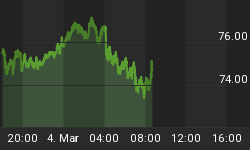Below is an extract from a commentary originally posted at www.speculative-investor.com on 20th January 2008.
There's a lot of talk about trying to stave off a recession using a combination of monetary and fiscal stimulus, but you can't stave off a recession that began months ago. And in any case, how could a recession possibly be avoided, or even postponed, by creating more money out of thin air? (Regardless of whether the stimulus comes in the form of tax cuts or increased government spending or lower interest rates, it boils down to creating money out of thin air since there isn't an existing supply of spare money at the disposal of the monetary authorities). If it were possible to do so then no country would ever have to experience a recession since officialdom always has the power to increase the money supply.
The idea that the government and the central bank should take steps to increase the supply of money to counteract an economic slowdown is based on the Keynesian fallacy that recessions are caused by insufficient aggregate demand. Nothing could be further from the truth.
Recessions occur because the inflationary policies of the government and the central bank lead to the misdirection of investment, which, in turn, results in a lot of the wrong stuff being produced. Putting it another way, the problem revolves around the fact that inflation distorts price signals, thus causing investment to be directed in ways that would not be justified in the absence of the inflation. You can't fix this problem by creating more inflation, and yet more inflation is the solution being advocated by almost everyone!
All the central bank and government can reasonably hope to achieve by a so-called "stimulus package" is a reduction in the purchasing power of the currency. This may hoodwink some people into believing that things are getting better, but actually things will be getting worse because the new inflation will lead to another round of misdirected investment.
Strangely, considering the almost universal acceptance of the idea that a stimulus package is needed, the sorts of proposals that are being advocated to address the current downturn have been tested and fallen flat on their faces many times in the past. That is, it's not like there isn't a mountain of empirical evidence to back-up the theory that fiscal/monetary "stimulus" hurts more than it helps. In fact, we only have to look back to the early years of this decade to see just how 'effective' the combination of massive monetary and fiscal stimulus can be.
Massive stimulus in the form of slashed interest rates, substantial tax cuts and a dramatic increase in government spending was implemented during 2001 in reaction to the economic downturn that began with the bursting of the NASDAQ bubble the year before, but the US economy remained in recession until mid-2003 (the US Government claims that the recession ended in November of 2001, but real-world observations tell us that recession-like conditions remained until at least the middle of 2003). Furthermore, the strong downward trend in the US stock market persisted for almost two years following the implementation of the combined monetary and fiscal stimulus. The stimulus measures put in place to address the economic downturn that began in 2000 were, however, largely responsible for inflating the gigantic mortgage-lending bubble. And we can see how well that turned out!
Creating a lot of money out of thin air will always have the effect of pushing-up prices somewhere in the economy, but it can't stimulate real growth. As a result, the downturns in the stock market and the economy will run their natural courses regardless of whether or not a stimulus package is implemented. Actually, the smaller the eventual stimulus package the better because the less harm it will do.
















